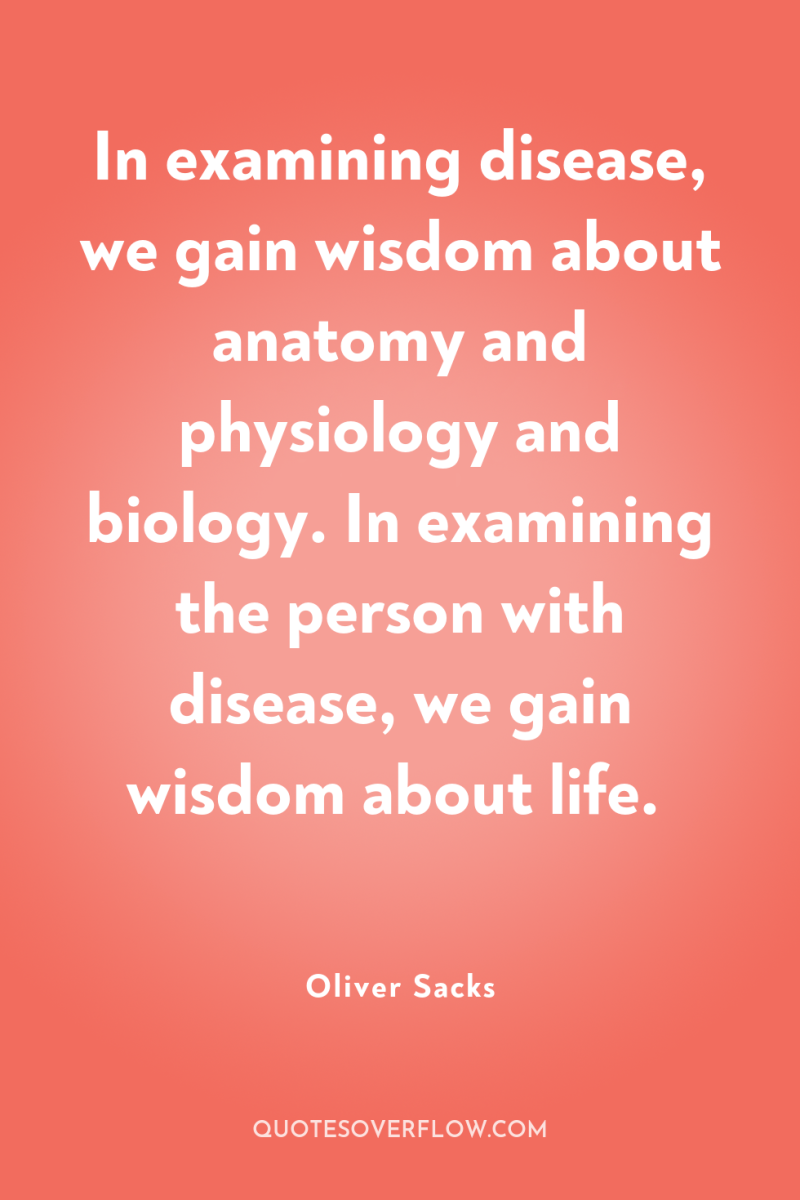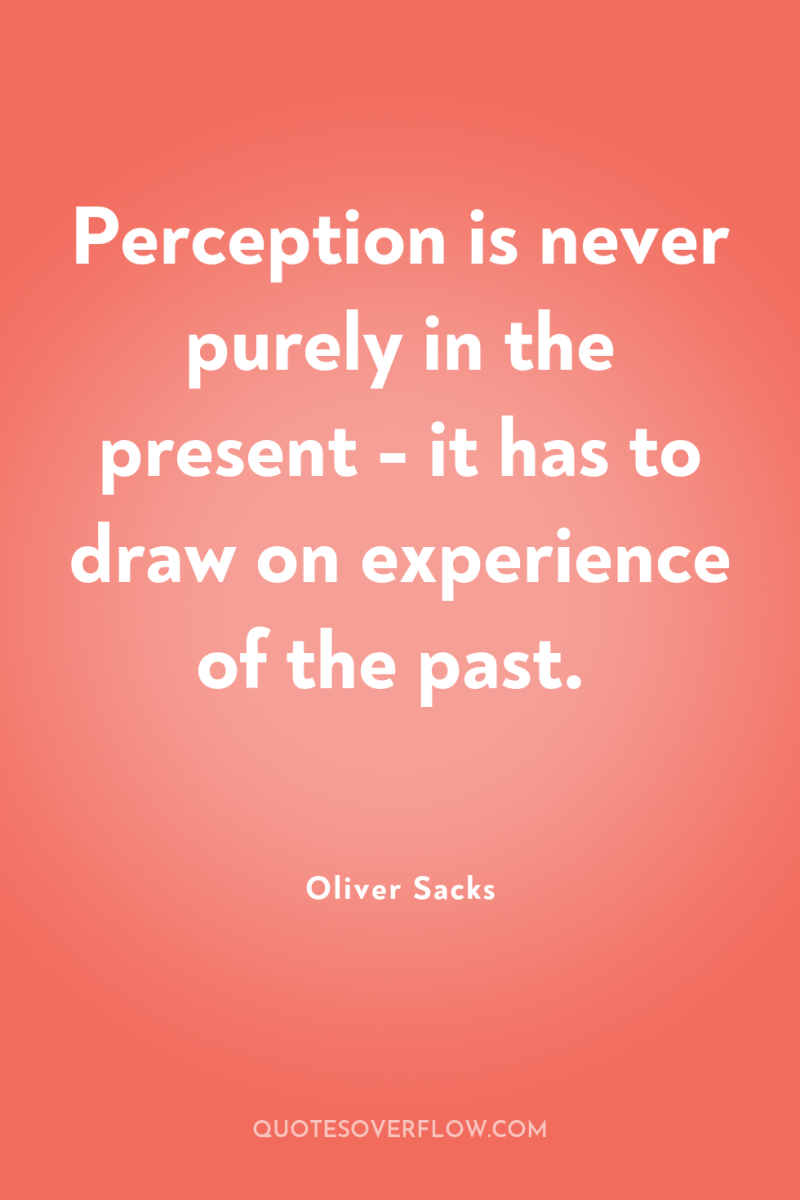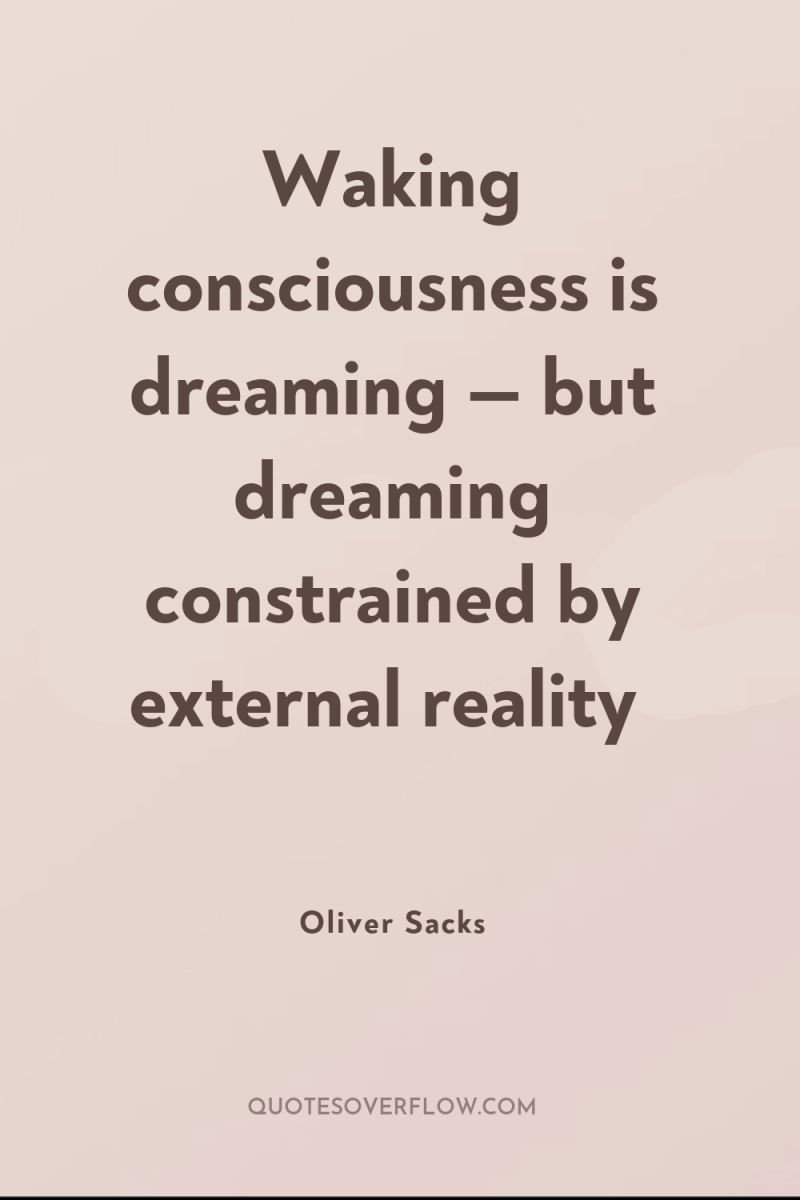1
To live on a day-to-day basis is insufficient for human beings; we need to transcend, transport, escape; we need meaning, understanding, and explanation; we need to see over-all patterns in our lives. We need hope, the sense of a future. And we need freedom (or, at least, the illusion of freedom) to get beyond ourselves, whether with telescopes and microscopes and our ever-burgeoning technology, or in states of mind that allow us to travel to other worlds, to rise above our immediate surroundings. We may seek, too, a relaxing of inhibitions that makes it easier to bond with each other, or transports that make our consciousness of time and mortality easier to bear. We seek a holiday from our inner and outer restrictions, a more intense sense of the here and now, the beauty and value of the world we live in.Oliver Sacks

2
In examining disease, we gain wisdom about anatomy and physiology and biology. In examining the person with disease, we gain wisdom about life.Oliver Sacks
3
Given her deafness, the auditory part of the brain, deprived of its usual input, had started to generate a spontaneous activity of its own, and this took the form of musical hallucinations, mostly musical memories from her earlier life. The brain needed to stay incessantly active, and if it was not getting its usual stimulation.., it would create its own stimulation in the form of hallucinations.Oliver Sacks
5
There are, of course, inherent tendencies to repetition in music itself. Our poetry, our ballads, our songs are full of repetition; nursery rhymes and the little chants and songs we use to teach young children have choruses and refrains. We are attracted to repetition, even as adults; we want the stimulus and the reward again and again, and in music we get it. Perhaps, therefore, we should not be surprised, should not complain if the balance sometimes shifts too far and our musical sensitivity becomes a vulnerability. .Oliver Sacks
6
Some people with Tourette's have flinging tics- sudden, seemingly motiveless urges or compulsions to throw objects..... (I see somewhat similar flinging behaviors- though not tics- in my two year old godson, now in a stage of primal antinomianism and anarchy)Oliver Sacks
7
Our tests, our approaches...are ridiculously inadequate. They only show us deficits, they do not show us powers; they only show us puzzles and schemata, when we need to see music, narrative, play, a being conducting itself spontaneously in its own natural way.Oliver Sacks

8
Perception is never purely in the present - it has to draw on experience of the past.Oliver Sacks
9
And I often dream of chemistry at night, dreams that conflate the past and the present, the grid of the periodic table transformed to the grid of Manhattan. […] Sometimes, too, I dream of the indecipherable language of tin (a confused memory, perhaps, of its plaintive “cry”). But my favorite dream is of going to the opera (I am Hafnium), sharing a box at the Met with the other heavy transition metals–my old and valued friends– Tantalum, Rhenium, Osmium, Iridium, Platinum, Gold, and Tungsten.Oliver Sacks

10
Waking consciousness is dreaming — but dreaming constrained by external realityOliver Sacks
11
If we wish to know about a man, we ask 'what is his story--his real, inmost story?'--for each of us is a biography, a story. Each of us is a singular narrative, which is constructed, continually, unconsciously, by, through, and in us--through our perceptions, our feelings, our thoughts, our actions; and, not least, our discourse, our spoken narrations. Biologically, physiologically, we are not so different from each other; historically, as narratives--we are each of us unique.Oliver Sacks
12
I find my thoughts, increasingly, not on the supernatural or spiritual but on what is meant by living a good and worthwhile life–achieving a sense of peace within oneself.Oliver Sacks
13
The power of music, whether joyous or cathartic must steal on one unawares, come spontaneously as a blessing or a grace--Oliver Sacks
14
Music evokes emotion and emotion can bring it's memory.Oliver Sacks
15
There is certainly a universal and unconscious propensity to impose a rhythm even when one hears a series of identical sounds at constant intervals... We tend to hear the sound of a digital clock, for example, as "tick-tock, tick-tock" - even though it is actually "tick tick, tick tick.Oliver Sacks
16
Very young children love and demand stories, and can understand complex matters presented as stories, when their powers of comprehending general concepts, paradigms, are almost nonexistent.Oliver Sacks
17
A union of literary and scientific cultures — there was not the dissociation of sensibility that was so soon to come ... Davy himself was writing (and sometimes publishing) a good deal of poetry at the time; his notebooks mix details of chemical experiments, poems, and philosophical reflections all together; and these did not seem to exist in separate compartments in his mind.Oliver Sacks
18
...read 1984 when it came out in 1949, and found its account of the ‘memory hole’ peculiarly evocative and frightening, for it accorded with my own doubts about my memory. I think that reading this led to an increase in my own journal keeping, and photographing, and an increased need to look at testimonies of the pastOliver Sacks
19
As Sicknes is the greatest misery, so the greatest misery of sicknes, is solitude... Solitude is a torment which is not threatened in hell itselfe.- D O N N EOliver Sacks
20
In this, then, lies their power of understanding--understanding, without words, what is authentic or inauthentic. Thus it was the grimaces, the histrionisms, the false gestures and, above all, the false tones and cadences of the voice, which rang false for those wordless but immensely sensitive patients. It was to these (for them) most glaring, even grotesque, incongruities and improprieties that my aphasic patients responded, undeceived and undeceivable by words. This is why they laughed at the President's speech. .Oliver Sacks
21
Thus the feeling I sometimes have - which all of us who work closely with aphasiacs have - that one cannot lie to an aphasiac. He cannot grasp your words, and cannot be deceived by them; but what he grasps he grasps with infallible precision, namely the expression that goes with the words, the total, spontaneous, involuntary expressiveness which can never be simulated or faked, as words alone can, too easily.Oliver Sacks
22
Music, uniquely among the arts, is both completely abstract and profoundly emotional. It has no power to represent anything particular or external, but it has a unique power to express inner states or feelings. Music can pierce the heart directly; it needs no mediation.Oliver Sacks
23
What an odd thing it is to see an entire species -- billions of people -- playing with, listening to meaningless tonal patterns, occupied and preoccupied for much of their time by what they call 'music.' (-- The Overlords, from Arthur C. Clarke's Childhood's End)Oliver Sacks
24
We speak not only to tell other people what we think, but to tell ourselves what we think. Speech is a part of thought.Oliver Sacks
25
I feel a sudden clear focus and perspective. There is no time for anything inessential. I must focus on myself, my work, and my friends.Oliver Sacks
26
I was on the shy side at school (one school report called me ‘diffident’) and Braefield had added a special timidity, but when I had a natural wonder... I lost all my diffidence, and freely approached others, all my fear forgotten.Oliver Sacks
27
[photography]... wanted to understand, to master for myself, all the processes involved, and to manipulate them in my own way.Oliver Sacks
28
My mother showed me that when tin or zinc was bent it uttered a special ‘cry’. ‘It’s due to deformation of the crystal structure, ’ she said, forgetting that I was five, and could not understand her - and yet her words fascinated me, made me want to know more.Oliver Sacks
29
I liked numbers because they were solid, invariant; they stood unmoved in a chaotic world. There was in numbers and their relation something absolute, certain, not to be questioned, beyond doubt.Oliver Sacks
30
I am a storyteller, for better and for worse. I suspect that a feeling for stories, for narrative, is a universal human disposition, going with our powers of language, consciousness of self, and autobiographical memory.Oliver Sacks
31
For 'wellness', naturally is no cause of complaint--people relish it, they enjoy it, they are at the furthest pole from complaint. People complain of feeling ill--not well. Unless, as George Eliot does, they have some intimation of 'wrongness' or danger, either through knowledge or association, or the very excess of excess. Thus, though a patient will scarcely complain of being 'very well', they may become suspicious if they feel 'too well'. .Oliver Sacks
32
Language, that most human invention, can enable what, in principle, should not be possible. It can allow all of us, even the congenitally blind, to see with another person’s eyes.Oliver Sacks
33
The brain is more than an assemblage of autonomous modules, each crucial for a specific mental function. Every one of these functionally specialized areas must interact with dozens or hundreds of others, their total integration creating something like a vastly complicated orchestra with thousands of instruments, an orchestra that conducts itself, with an ever-changing score and repertoire.Oliver Sacks
34
I cannot pretend I am without fear. But my predominant feeling is one of gratitude.Oliver Sacks
35
The power of music, narrative and drama is of the greatest practical and theoretical importance. One may see this even in the case of idiots, with IQs below 20 and the extremest motor incompetence and bewilderment. Their uncouth movements may disappear in a moment with music and dancing–suddenly, with music, they know how to move. We see how the retarded, unable to perform fairly simple tasks involving perhaps four or five movements or procedures in sequence, can do these perfectly if they work to music–the sequence of movements they cannot hold as schemes being perfectly holdable as music, i.e. embedded in music. The same may be seen, very dramatically, in patients with severe frontal lobe damage and apraxia–an inability to do things, to retain the simplest motor sequences and programmes, even to walk, despite perfectly preserved intelligence in all other ways. This procedural defect, or motor idiocy, as one might call it, which completely defeats any ordinary system of rehabilitative instruction, vanishes at once if music is the instructor. All this, no doubt, is the rationale, or one of the rationales, of work songs.Oliver Sacks
36
At 11, I could say ‘I am sodium’ (Element 11), and now at 79, I am gold.Oliver Sacks
37
The real functional "machinery" of the brain, for Edelman, consists of millions of neuronal groups, organized into larger units or "maps". These maps, continually conversing in everchanging, unimaginably complex, but always meaningful patterns, may change in minutes or seconds. One is reminded of C. S. Sherrington's poetic evocation of the brain as "an enchanted loom", where "millions of flashing shuttles weave a dissolving pattern, always a meaningful pattern though never an abiding one; a shifting harmony of subpatterns".Oliver Sacks
38
There was an irony and a paradox here: Franco thought of Pontito constantly, saw it in fantasy, depicted it, as infinitely desirable — and yet he had a profound reluctance to return. But it is precisely such a paradox that lies at the heart of nostalgia — for nostalgia is about a fantasy that never takes place, one that maintains itself by not being fulfilled. And yet such fantasies are not just idle daydreams or fancies; they press toward some fulfillment, but an indirect one - the fulfillment of art. These, at least, are the terms that D. Geahchan, the French psychoanalyst, has used. With reference in particular to the greatest of nostalgies, Proust, the psychoanalyst David Werman speaks of an 'aesthetic crystallization of nostalgia' - nostalgia raised to the level of art and myth.Oliver Sacks
39
If the students were taught about shuttle flights, plate tectonics and submarine volcanoes, they were also immersed in the traditional myths of their culture–the ancient story, for example, of how the island of Pohnpei had been built under the direction of a mystical octopus, Lidakika. (I was fascinated by this, for it was the only cephalopod creation myth I had ever heard.Oliver Sacks